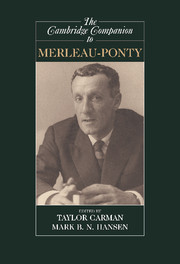Book contents
- Frontmatter
- Introduction
- 1 Merleau-Ponty and the Epistemological Picture
- 2 Sensation, Judgment, and the Phenomenal Field
- 3 Seeing Things in Merleau-Ponty
- 4 Motives, Reasons, and Causes
- 5 Merleau-Ponty and Recent Cognitive Science
- 6 The Silent, Limping Body of Philosophy
- 7 Merleau-Ponty and the Touch of Malebranche
- 8 A Phenomenology of Life
- 9 The Embryology of the (In)visible
- 10 Merleau-Ponty’s Existential Conception of Science
- 11 Between Philosophy and Art
- 12 Understanding the Engaged Philosopher: On Politics, Philosophy, and Art
- 13 Thinking Politics
- References
- Index
13 - Thinking Politics
Published online by Cambridge University Press: 28 May 2006
- Frontmatter
- Introduction
- 1 Merleau-Ponty and the Epistemological Picture
- 2 Sensation, Judgment, and the Phenomenal Field
- 3 Seeing Things in Merleau-Ponty
- 4 Motives, Reasons, and Causes
- 5 Merleau-Ponty and Recent Cognitive Science
- 6 The Silent, Limping Body of Philosophy
- 7 Merleau-Ponty and the Touch of Malebranche
- 8 A Phenomenology of Life
- 9 The Embryology of the (In)visible
- 10 Merleau-Ponty’s Existential Conception of Science
- 11 Between Philosophy and Art
- 12 Understanding the Engaged Philosopher: On Politics, Philosophy, and Art
- 13 Thinking Politics
- References
- Index
Summary
THE SITUATION OF THE PHILOSOPHER
Is the philosophy of our age, Sartre asks, dead or alive? Must we cultivate the field or raze the moldering edifice? Yet thought rejects stark choices of this kind. We know full well that Marx did not demolish Hegel, that Kant did not leave Cartesianism in ruins. How could a serious assessment of Marxism be captured in a simple verdict? Consider instead what Merleau-Ponty tells us in the Introduction to Signs:
The history of thought does not summarily pronounce: This is true; that is false. Like all history, it has its veiled decisions. It dismantles or embalms certain doctrines, changing them into “messages” or museum pieces. There are others, on the contrary, which it keeps active. These do not endure because there is somemiraculous adequation or correspondence between them and an invariable “reality” – such an exact and fleshless truth is neither sufficient nor necessary for the greatness of a doctrine – but because, as obligatory steps for those who want to go further, they retain an expressive power which exceeds their statements and propositions.
Or again: “We are saying that a reexamination of Marx would be a meditation upon a classic, and that it could not possibly terminate in a nihil obstat or a listing on the Index” (S 16–17/10–11).
- Type
- Chapter
- Information
- The Cambridge Companion to Merleau-Ponty , pp. 352 - 380Publisher: Cambridge University PressPrint publication year: 2004



